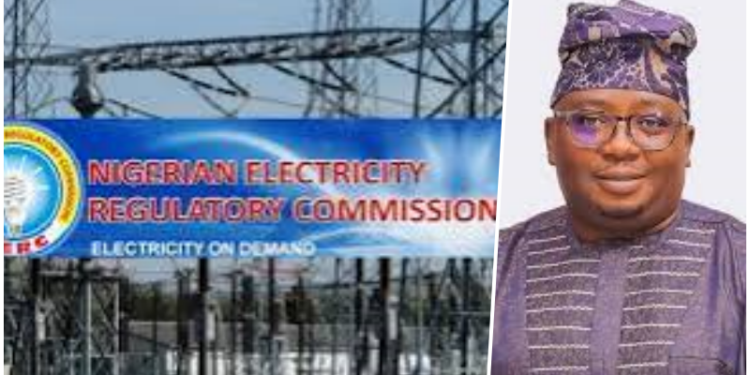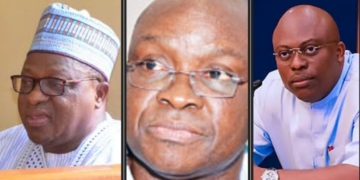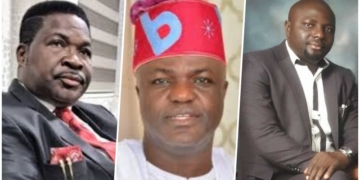- On April 3, 2024 FG, NERC increases electricity tariff of Band A customers to 300%
- Experts say the increase will further lead to more inflation in Nigeria
- NLC, NACCIMMA, others kick, ask FG to reverse the increase
On April 3, 2024 the Nigerian Electricity Regulatory Commission has approved an increase in electricity tariff for customers under the Band A classification.
This is coming less than one year after the Federal Government unilaterally removed subsidy from petrol, throwing Nigerians into inexplicable hardship as prices of goods and services escalated.
The Vice Chairman, NERC, Musliu Oseni, said the increase will see the customers paying N225 kilowatt per hour from the current N66.
WITHIN NIGERIA that customers under Band A are those who enjoy 20 hours of electricity supply daily.
Speaking at a press conference in Abuja on Wednesday, Oseni said customers in Band A represent a 15 per cent of the 12 million electricity customers in the country.01
He added that the commission had also downgraded some customers on the Band A to Band B due to the non-fulfillment of the required hours of electricity provided by the electricity distribution company.
He said, “We currently have 800 feeders that are categorized as Band A, but it will now be reduced to under 500. This means that 17 per cent now qualify as Band A feeders. These feeders only service 15 per cent of total electricity customers connected to the feeders.

“The commission has issued an order which is titled ‘April Supplementary Order’ and the commission allows a 225 kilowatt per hour.
What does “Band A” actually mean?
WITHIN NIGERIA findings reveal that NERC Service-Based Tariff, SBT, scheme classifies consumers based on the number of hours of electricity supply per day.
According to SBT introduced on the 1st of November 2020, it classifies consumers into Bands A to E as follows: Band A: Minimum of 20 Hours, Band B: Minimum of 16 Hours, Band C: Minimum of 12 Hours, Band D: Minimum of 8 Hours and Band E: Minimum of 4 Hours.
History of electricity tariff increase in Nigeria
WITHIN NIGERIA findings showed that from 2015 to 2019 when All Progressives Congress, APC took mantle of leadership, electricity tariffs have increased by more than 300 per cent.
Each increase, it was gathered was always preceded by government’s promise for better service delivery to the citizens, even as consumers continue to rue poor services.
Within the period of time, electricity generation has remained poor while distribution has been even poorer.
However, between 2015 and 2019, the average electricity tariff climbed from N12 kWh to about N32kWh and is slated to go up again by about 30 per cent in 2020, which it did.
Our findings also showed that investors that took over the running of the electricity distribution carved out from the defunct Power Holding Company of Nigeria in 2013 demanded a cost-reflective tariff.
By and large, in June 2015, the Nigerian Electricity Regulatory Commission issued new electricity tariffs that became effective for commercial and industrial consumers from April 1, 2015.
Despite the increases in tariffs, Nigeria’s power generation has continued to hover between 3,500 megawatts and 4,000MW since the sector was officially privatized in November 2013.
In January 1, 2021, the Federal Government once again increased the electricity tariff payable by power consumers across the country.
It was gathered that the approval for the hike in tariff was given by the Nigerian Electricity Regulatory Commission, as the increase which varies based on different consumer classes took effect from January 1, 2021.
The NERC announced the tariff hike in its December 2020 minor review of the Multi-Year Tariff Order and Minimum Remittance Order.0:07 / 1:01
The January 2021 tariff increase was coming just two months after the government through NERC implemented a hike in November 2020, which saw widespread opposition.
The MYTO order containing the latest tariff hike, Order NERC/225/2020, was signed by the new Chairman of NERC, Sanusi Garba, and it supersedes the previous Order NERC/2028/2020.
Providing reasons for the latest tariff hike, the commission said it considered the 14.9 per cent inflation rate rise in November 2020 and foreign exchange of N379.4/$1 as of December 29, 2020.
Also in February 2022, the Federal government increased electricity tariff across the country.
This is as citizens continue to battle the electricity crisis across the country.
Disclosing this in Abuja, the Chairman of NERC, Sanusi Garba, said that the adjustment was made in February following some economic fundamentals considered by the commission.
“What happened on February 1, 2022, is a minor review of tariff. It is very clear on our website that every six months we will adjust rates to take care of the foreign exchange component of cost and also inflation.
“This is absolutely a straight forward thing but even at that we do publish in newspapers that NERC is about to embark on a minor review to adjust some parameters and when the computation is done it goes into rates which we put on our website and the distribution companies have a responsibility to put it out to consumers,” he said.
He stressed that the role of the commission is to make a determination of the rates that consumers should pay, while creating a balance between consumers and investors.

Commenting on the poor state of power supply, Garba, said that the concerted efforts at resolving challenges in the electric power supply chain will bring back supply to the threshold of over 4,000MW soon.
Economic implications of the Electricity tariff increase in Nigeria
The economic implications of electricity tariff increase is so much enormous that economic experts have begun to equate it with that of fuel subsidy removal which has literally put millions of Nigerians on the economic edge.
In any case, with the recent tariff increase which findings showed was mainly on the industrial areas, there is palpable fear that this will affect the price of goods and services in the country.
Apart from pushing the already impoverished Nigerians on the edge, the increase will further lead to closure of many industries, factories and businesses which couldn’t afford the new tariff thereby throwing more Nigerians out of job and into criminalities.
Recent hike in electricity tariff in the country will also tighten the noose on the ease of doing business in Nigeria which in its effect will discourage both foreign and local investment in the country.
Reactions to the new tariff
However, the NLC described the decision of the Federal Government to hike the electricity tariff as insensitive and callous.
The NLC’s spokesman, Benson Upah, made this known in an interview with newsmen.
According to him, “the government’s decision is not only insensitive, it is callous. It further pauperises consumers, especially workers whose wages are fixed and insufficient.
“It similarly makes the operating environment more hostile for manufacturers with the potential for an astronomical rise in the cost of goods and services or the worst case scenario, more closures and loss of jobs.
“The only people who stand to gain from this mindless social violence against the people are the World Bank and IMF (International Monetary Fund).”
On their part, the Trade Union Congress said the Federal Government was only concerned about revenue generation to the detriment and survival of the citizens.
“We understand the necessity of aligning energy costs with market realities to foster sector investment and sustainability. Nevertheless, we stress the importance of considering the broader economic impact on industries and the timing of such adjustments.
“NACCIMA continues to advocate for a transparent and gradual approach in policy implementation, emphasizing the need for broad stakeholder engagement to mitigate adverse effects on business competitiveness and consumer prices.’’
On its part, the Centre for the Promotion of Private Enterprise, in a statement signed by its Chief Executive Officer, Muda Yusuf, said that the power sector issue had become a major conundrum in the economy.
It added that while tariff review was an inevitability, a 300 per cent increase in one fell swoop is difficult to justify.
The organisation said, “There is a major funding and liquidity crisis which is posing a significant risk to investments in the electricity value chain.
“Costs across the chain have been rising as a result of the multiple macroeconomic headwinds. Meanwhile, the system is not generating the desired liquidity to match the escalating costs.”
The centre also argued that beyond tariff hikes, some fundamental issues need to be addressed in the electricity value chain.
“They may say it applies to only Band A, but there is no way it would not have a ripple effect on the final consumer. It still boils down to the fact that our government needs to find a way of ameliorating the economic hardship.”
Ogundare, who is also a lecturer at the Ajayi Crowther University, Oyo State, added, “All over the world, there is subsidy, for agricultural products, energy.
“If you are increasing the energy tariff now, what are you subsidising for the populace? True, the increment doesn’t affect everyone but those who are affected would shift the effect to other people. At this point for me, it is not acceptable.”
An economist with the School of Management and Social Sciences, Pan-Atlantic University, Prof. Bright Eregha, also expressed similar sentiments.
Another economist at Lotus Beta Analytics, Shadrach Israel, said the government should be ready to hear more lamentations from the already impoverished citizens.
“I heard the news of the electricity subsidy removal and I was shocked that the government would think of such a move at this time. No one is complaining yet and I still wonder why. I believe that when the new rate takes effect, we will begin to hear lamentations from the people.
“This move is too early and the government should have thought of an alternative to energy for production than just removing subsidy,” he said.
Also, Comrade Ibrahim Zikirullahi, Executive Director of the Resource Centre for Human Rights and Civic Education (CHRICED), slammed the federal government for raising electricity tariffs without consulting relevant stakeholders, “especially in light of the ongoing hardships caused by the removal of fuel subsidies and the Naira’s instability.”
He claimed that similar to the unilateral removal of petrol subsidies, the government’s policies demonstrated a disregard for the welfare of the people.
“In a democratic society, the government is expected to prioritise the interests of the people; however, when this principle is ignored, it represents a return to a dictatorial era. The APC has consistently demonstrated an authoritarian political culture that can be traced back to the General Buhari administration.
“This authoritarian culture has now permeated all aspects of Nigerian social relations, resulting in widespread insecurity, high unemployment, rampant poverty, and the naira’s rapid depreciation.
“We have now reached a critical juncture in which the people must take responsibility for their survival,” he stated.
Andrew Mamedu, Country Director of ActionAid Nigeria, stated that the new tariff hike would place an “unbearable burden on already struggling Nigerian households, particularly low-income families, vulnerable communities, and SMEs.”
According to him, the government must acknowledge that its decision to remove the fuel subsidy contributed to the current situation.
“Therefore, the government should be prepared to bear the brunt of these policy decisions without unduly burdening Nigerian citizens.
“It is important to note that energy security is one of the major areas that contribute to national security and welfare, which explains why countries take their energy sector seriously and are constantly working to ensure its availability and affordability.
“For example, the Canadian government is currently providing up to a 100 Canadian dollar subsidy this year to support homes due to economic hardship,” Mamedu explained.
He stated that the government’s current priority should be to investigate alternative solutions that prioritise improving the efficiency of electricity distribution, combating corruption in the energy sector, and promoting renewable energy sources.




Discussion about this post